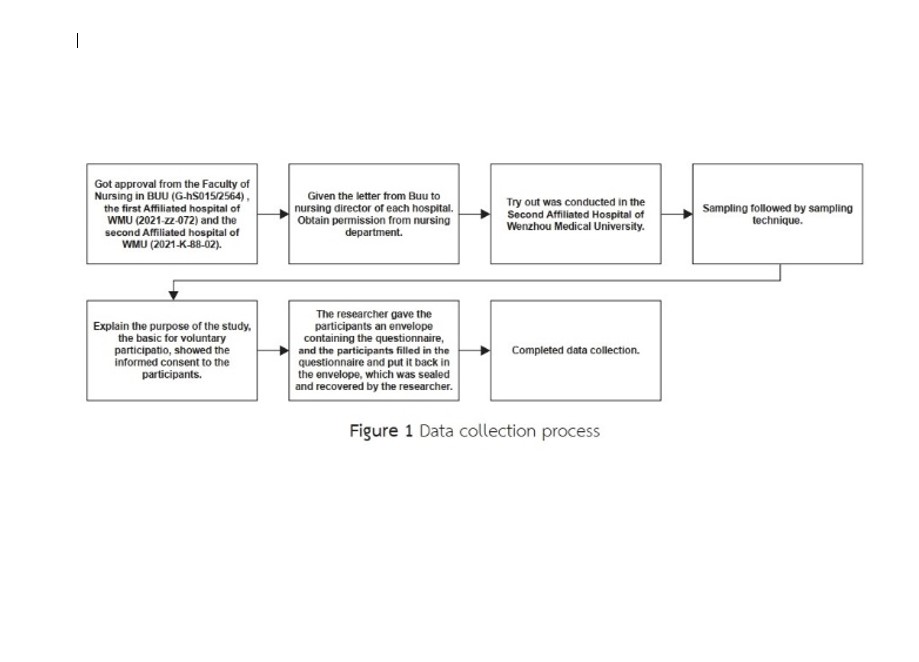FACTORS INFLUENCING STRESS AMONG NURSES IN WENZHOU, CHINA: A CROSS-SECTIONAL STUDY
คำสำคัญ:
Nurses, Psychological Capital, Social Support, Stress, Stressorsบทคัดย่อ
This predictive correlational study aimed to elucidate the psychological stress experienced by nurses in Wenzhou, China. Additionally, it seeks to discern the predictive power of various associated independent variables concerning nurse stress. The study involved 173 nurses functioning within adult inpatient wards, chosen through a multistage random sampling methodology. Data compilation employed a comprehensive array of tools including demographic questionnaires, the Perceived Stress Scale, the Chinese Nurse Stressor Scale, the Brief COPE, the Perceived Social Support Scale, and the Psychological Capital Questionnaire. The analysis incorporated Pearson correlation coefficients and multiple linear regression.
The findings disclosed a moderate level of nurse stress, with a score of 17.06 ± 4.532 out of a possible 40. Nursing stressors, social support, and psychological capital collectively accounted for 32.4% of the variability observed in stress levels among nurses operating within Wenzhou hospitals. These outcomes underscore the significance of addressing nurse stress through strategies such as mitigating nursing stressors, bolstering social support structures, and enhancing psychological capital.
Future research should focus on developing interventions designed to alleviate nurse stress. These interventions should prioritize the reduction of nursing stressors, the augmentation of social support networks, and the enhancement of nurses’ psychological capital.
เอกสารอ้างอิง
Alharbi, H., & Alshehry, A. (2019). Perceived stress and coping strategies among ICU nurses in government tertiary hospitals in Saudi Arabia: A cross-sectional study. Annals of Saudi Medicine, 39(1), 48-55. doi:10.5144/0256-4947.2019.48
Chang, X. (2022). Investigation on work stress perception and coping strategies of clinical nurses in tertiary hospitals. Master's Thesis, Nursing, Xinxiang Medical University.
Cohen, S., Kamarck, T., & Mermelstein, R. (1983). A global measure of perceived stress. Journal of Health and Social Behavior, 24(4), 385-396.
Gu, B., Tan, Q., & Zhao, S. (2019). The association between occupational stress and psychosomatic wellbeing among Chinese nurses: A cross-sectional survey. Medicine (Baltimore), 98(22), e15836. doi:10.1097/md.0000000000015836
Jiang, Q. J. (2001). Perceivedsocial support scale (PSSS). Handbook of Behavioral Medicine Scale (Special Issue), 41-42
Kim, S., & Kweon, Y. (2020). Psychological capital mediates the association between job stress and burnout of among Korean Psychiatric Nurses. Healthcare, 8(3), 199. doi:http://dx.doi.org/10.3390/healthcare8030199
Lazarus, R. S., & Folkman, S. (1984). Stress, appraisal, and coping. New York, NY: Springer Publishing
Li, X., & Liu, Y. (2000). Job stressors and burnout among staff nurses. Chinese Journal of Nursing, 35(11), 645-649.
Luo, H., & He, Z. (2010). Reliability and validity analysis of psychological capital questionnaire in nurses. Chinese Journal of Behavioral Medicine and Brain Science, 19(9), 853-854.
Luthans, F., Youssef, C., & Avolio, B. (2006). Psychological capital: Developing the human competitive edge. New York: Oxford University Press.
Matheny, K. B., & McCarthy, C. J. (2000). Write your own prescription for stress. Washington, DC: New Harbinger Publications.
Polit, D. F., & Beck, C. T. (2017). Nursing research (10th ed.). Wolters Kluwer: Lippincott Williams & Wilkins.
Portero de la Cruz, S., Cebrino, J., Herruzo, J., & Vaquero-Abellán, M. (2020). A multicenter study into burnout, perceived stress, job satisfaction, coping strategies, and general health among emergency department nursing staff. J Clin Med, 9(4). doi:10.3390/jcm9041007
Sun, X., Jing, Y., Zhou, J., Wang, C., & Ji, F. (2020). Nurses’ anxiety degree and its correlation with perceived stress and coping style during the prevention and control of coronavirus disease 2019. Henan Medical Research, 29(23), 4225-4228. doi:10.3969/j.issn.1004-437X.2020.23.001
Tang, K. N. S., Chan, C. S., Ng, J., & Yip, C.-H. (2016). Action type-based factorial structure of brief COPE among Hong Kong Chinese. Journal of Psychopathology and Behavioral Assessment, 38(4), 631-644. doi:DOI 10.1007/s10862-016-9551-0
Wang, Z., Wang, Y., Wu, Z. G., Chen, D. D., Chen, J., & Xiao, Z. P. (2015). Reliability and validity of the Chinese version of perceived stress scale. Journal of Shanghai Jiao Tong University Medical Science, 35(10), 1448-1451.doi:https://doi.org/10.3969/j.issn.1674-8115.2015.10.004
Yao, X., Lin, Y., & Zhang, C. (2022). The status of psychological capital and coping style and their influence on ocupational stres among ICU nurses. Ind Hlth & Ocup Dis, 48(1), 30-33. doi:doi:https://doi.org/10.3969/j.issn.1674-8115.2015.10.004
Yu, P., Yuan, L., Wang, D., Bob, L., Ping, F., & Jia, C. (2019). Reliability and validity brief COPE scale in medical college students. Journal of Shandong University (Health Sciences), 57(1), 101-106. doi:1O.6040/j.issn.1671-7554.0.2018.795
Zheng, S., Sui, L., Zhang, X., & Yang, H. (2019). Investigation and analysis of nurses' stressor level and its related influencing factors. International Journal of Nursing, 38(24), 4074-4077. doi:10.3760/cma.j.issn.1673-4341.2019.24.013

ดาวน์โหลด
เผยแพร่แล้ว
รูปแบบการอ้างอิง
ฉบับ
ประเภทบทความ
สัญญาอนุญาต

อนุญาตภายใต้เงื่อนไข Creative Commons Attribution-NonCommercial-NoDerivatives 4.0 International License.




